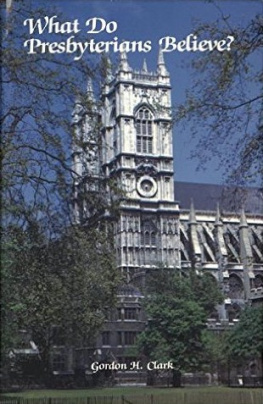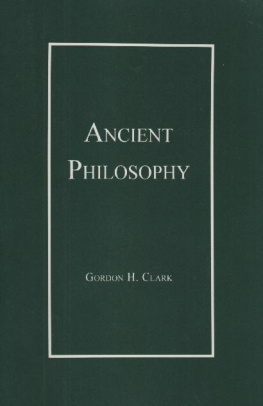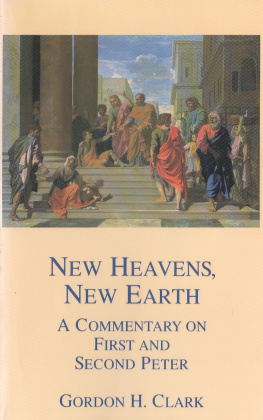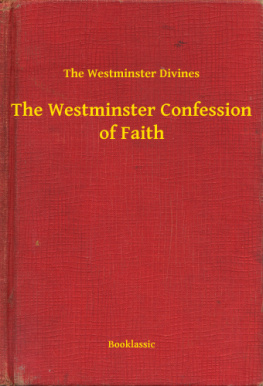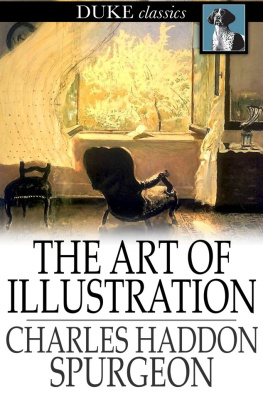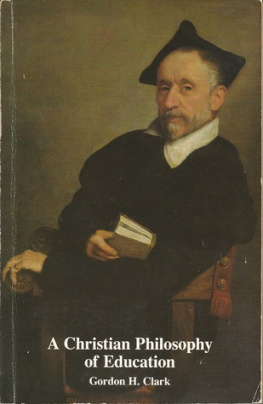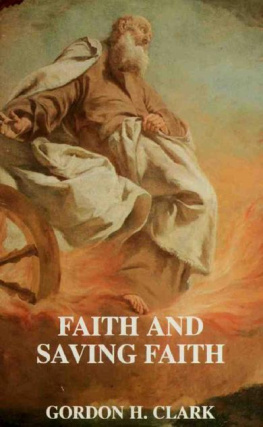Gordon Haddon Clark - What do Presbyterians believe? : the Westminster Confession, yesterday and today
Here you can read online Gordon Haddon Clark - What do Presbyterians believe? : the Westminster Confession, yesterday and today full text of the book (entire story) in english for free. Download pdf and epub, get meaning, cover and reviews about this ebook. City: Phillipsburg, N.J., year: 1985, publisher: Presbyterian and Reformed Pub. Co., genre: Religion. Description of the work, (preface) as well as reviews are available. Best literature library LitArk.com created for fans of good reading and offers a wide selection of genres:
Romance novel
Science fiction
Adventure
Detective
Science
History
Home and family
Prose
Art
Politics
Computer
Non-fiction
Religion
Business
Children
Humor
Choose a favorite category and find really read worthwhile books. Enjoy immersion in the world of imagination, feel the emotions of the characters or learn something new for yourself, make an fascinating discovery.
- Book:What do Presbyterians believe? : the Westminster Confession, yesterday and today
- Author:
- Publisher:Presbyterian and Reformed Pub. Co.
- Genre:
- Year:1985
- City:Phillipsburg, N.J.
- Rating:5 / 5
- Favourites:Add to favourites
- Your mark:
- 100
- 1
- 2
- 3
- 4
- 5
What do Presbyterians believe? : the Westminster Confession, yesterday and today: summary, description and annotation
We offer to read an annotation, description, summary or preface (depends on what the author of the book "What do Presbyterians believe? : the Westminster Confession, yesterday and today" wrote himself). If you haven't found the necessary information about the book — write in the comments, we will try to find it.
Gordon Haddon Clark: author's other books
Who wrote What do Presbyterians believe? : the Westminster Confession, yesterday and today? Find out the surname, the name of the author of the book and a list of all author's works by series.
What do Presbyterians believe? : the Westminster Confession, yesterday and today — read online for free the complete book (whole text) full work
Below is the text of the book, divided by pages. System saving the place of the last page read, allows you to conveniently read the book "What do Presbyterians believe? : the Westminster Confession, yesterday and today" online for free, without having to search again every time where you left off. Put a bookmark, and you can go to the page where you finished reading at any time.
Font size:
Interval:
Bookmark:
Concernig Creeds
George S. Hendry, The Westminster Confession for Today, p. 13; John Knox Press.
Chapter 1
Copyright 1955. Manna Music, Inc., Hollywood, California 90028. Used by permission.
For a more detailed analysis of the logical position of the truth of the Bible, Can 1 Trust My Bible, Chapter One, How May I Know the Bible Is Inspired, Moody Press, 1963.
Chapter 3
The Westminstcr Confession for Today, pp. 51, 52.
Chapter 4
Wieman, Macintosh and Otto, Is There a God? p. 13.
Chapter 6
Op. cit., p. 81.
Chester Wilkins, A Handbook for Personal Soul-Winning; Light and Hope Publications, 1950.
Chapter 9
The Protestant movement, arising out of the Reformation, is divided chiefly into three sections: the Lutheran, the Reformed (which includes the Presbyterian churches), and the Arminian (which is mainly equated with the Methodist churches).
Chapter 10
I. A. Dorner, A System of Christian Doctrine, tr. by Cave and Banks, Vol. IV, p. 199.
Appendix
An address given at Weaverville, N. C., August 17, 1955.
GORDON H. CLARK
With an Introduction by John R. Richardson, D.D.
Presbyterian and Reformed Publishing Company Phillipsburg, New Jersey
Copyright 1956, 1965
Presbyterian and Reformed Publishing Company
All rights reserved. No part of this book may be reproduced in any form or by any means, except for brief quotations for the purpose of review, comment, or scholarship, without written permission from the publisher, Presbyterian and Reformed Publishing Company, Box 817, Phillipsburg, New Jersey 08865.
Printed in the United States of America
ISBN: 0-87552-140-1
Library of Congress Catalog Card Number: 65-27481
During the winter of 1954-1955 there appeared in The Southern Presbyterian Journal a series of articles on the Westminster Confession. They were so well received that it was decided to republish them in book form.
However, the original articles, since they were intended to be altogether popular, made no pretense of covering the whole Confession in the manner of a commentary. It has been thought wise therefore to add a second section to each chapter so that the book might serve the purposes of study classes and discussion groups. Even so, it is still not a formal commentary.
There have been times in the history of Gods people, for example, in the days of Jeremiah, when refreshing grace and widespread revival were not to be expected: the time was one of chastisement. If this twentieth century is of a similar nature, individual Christians here and there can find comfort and strength in a study of Gods Word. But if God has decreed happier days for us and if we may expect a world-shaking and genuine spiritual awakening, then it is the authors belief that a zeal for souls, however necessary, is not the sufficient condition. Have there not been devout saints in every age, numerous enough to carry on a revival? Twelve such persons are plenty. What distinguishes the arid ages from the period of the Reformation, when nations were moved as they had not been since Paul preached in Ephesus, Corinth, and Rome, is the latters fullness of knowledge of Gods Word. To echo an early Reformation thought, when the ploughman and the garage attendant know the Bible as well as the theologian does, and know it better than some contemporary theologians, then the desired awakening shall have already occurred. To such an end this book is dedicated as a minor means.
G.H.C.
The Westminster Assembly convened in Westminster Abbey in London on July 1, 1643. This body engaged in honest and thoughtful activity for five years, six months, and twenty-two days. Thoroughness is conspicuous in all of its work. Church historians agree that this was one of the most learned bodies ever assembled on this earth for the formulation and promulgation of Christian truth. The personnel of this body was composed of the intellectual cream of the British Isles. Every member was carefully selected on the basis of learning and intellectual gifts.
This group of divines was characterized also by deep and genuine spirituality. These men were spiritual giants. For the full period of their labors it was their custom to set aside one entire day of each month for prayer and fasting. The men who composed this assembly were, therefore, prepared intellectually and spiritually for their task.
In our day of renewed interest in Biblical theology it is well to remember that the primary rule these servants of Christ laid down for themselves, to guide in all their discussions, was: What any man undertakes to prove as necessary, he shall make good out of Scripture. Every member was required to take the following vow, and it was read to all of the members every Monday morning: I do seriously promise and vow, in the presence of Almighty God, that in this Assembly whereof I am a member, I will maintain nothing in point of doctrine but what I believe to be most agreeable to the Word of God; nor in point of discipline, but what may make most for Gods glory and the peace and good of His church.
Present in this body of men were some of the most brilliant of contemporary philosophers, but they permitted not one iota of human philosophy to influence their creedal statements. Their sole objective was to think Biblically and to express the mind of Scripture. The success of this undertaking is evidenced in the fact that although better than three centuries have passed since the publication of this work, the Confession of Faith has needed no significant change during all this time.
Richard Baxter, a contemporary of the Westminster divines, wrote in his autobiography an evaluation of this assembly. He affirmed: The Divines there congregated were men of eminent learning, godliness, ministerial abilities, and fidelity; and being not worthy to be one of them myself, I may the more speak the truth, even in the face of malice and envy, that, as far as I am able to judge by the information of all history of that time, and by any other evidence left us, the Christian world, since the days of the apostles, had never a Synod of more excellent divines (taking one thing with another), than this and the Synod of Dort. Dean Stanley of the Anglican church declared that of all Protestant Confessions the Westminster Confession exhibits far more depth of theological insight than any other.
Fair-minded scholars must concede that the goal that the Westminster Assembly kept before it of giving to the accepted Bible system of truth a complete, impregnable statement, to serve as a bulwark against error, as a basis of ecclesiastical fellowship and cooperation, and as a safe and effectual instrument for the religious instruction of the people of God and their children, has been attained in a marvelous way. Judged by any sensible standard the Westminster Assembly ranks among the greatest of the ecclesiastical assemblies or councils in the entire history of Christianity.
During the past three decades many Presbyterians have ignored or failed to appreciate the wealth of Christian truth found in the Westminster Confession of Faith, the official creed of Presbyterianism. The result is, the Calvinistic system means little to them. This neglect of our inheritance has proved expensive to our Church. It is a source of weakness. Many who wear the label Presbyterian are destitute of knowledge and respect for this classical creedal statement of the Church.
About a year ago Dr. Gordon H. Clark, a front-line philosopher and a brilliant theologian, published in The Southern Presbyterian Journal a series of articles on the Confession of Faith. These studies were characterized by remarkable originality and lucidity. The spirit of his articles was affirmative and constructive. His purpose at all times has been to explain, and not explain away, the difficult portions of the Christian message. Each chapter presents a wealth of penetrating insights.
Font size:
Interval:
Bookmark:
Similar books «What do Presbyterians believe? : the Westminster Confession, yesterday and today»
Look at similar books to What do Presbyterians believe? : the Westminster Confession, yesterday and today. We have selected literature similar in name and meaning in the hope of providing readers with more options to find new, interesting, not yet read works.
Discussion, reviews of the book What do Presbyterians believe? : the Westminster Confession, yesterday and today and just readers' own opinions. Leave your comments, write what you think about the work, its meaning or the main characters. Specify what exactly you liked and what you didn't like, and why you think so.

